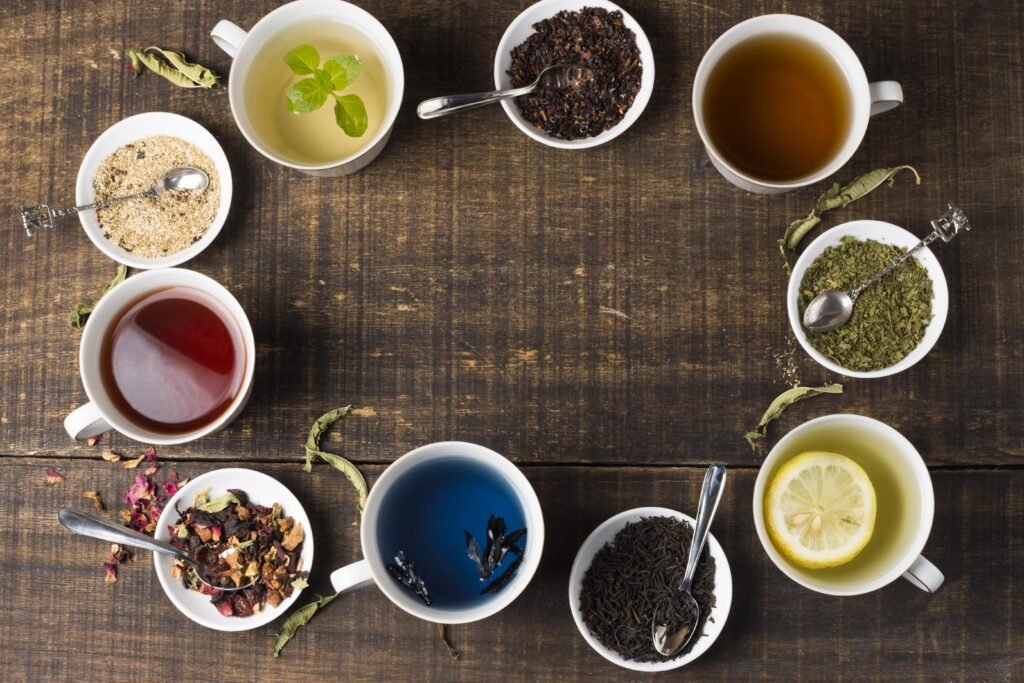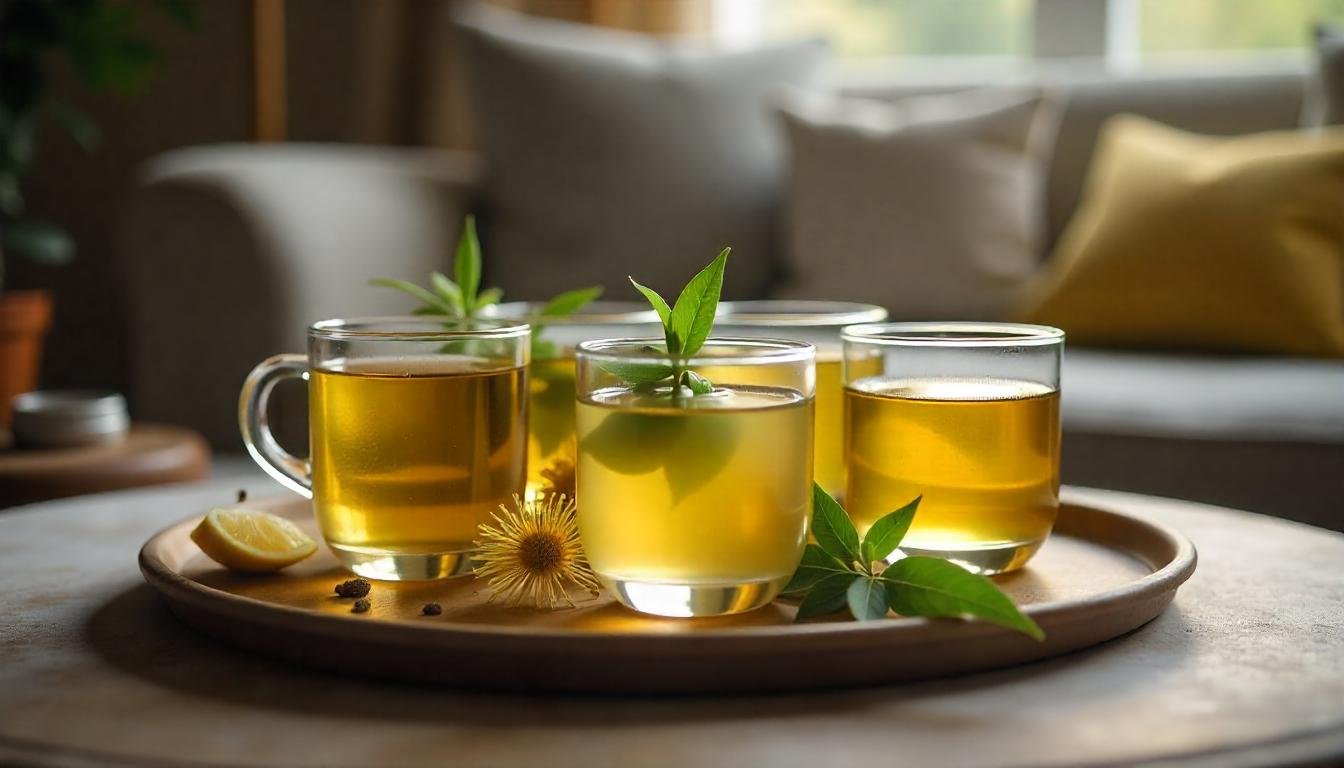In today’s fast-paced world of processed foods, stress, and sedentary lifestyles, digestive issues have become increasingly common. Bloating, indigestion, acid reflux, and sluggish metabolism are just a few signs that your gut might need some TLC. While modern medicine offers relief, many are turning to ancient herbal remedies for a more natural and gentle solution—herbal teas.
Herbal teas are more than just comforting beverages. For centuries, cultures worldwide have used them to support digestion and promote gut health. Packed with plant-based compounds, these teas can soothe the stomach, stimulate digestive enzymes, and balance the microbiome.
In this post, we’ll explore the best herbal teas for digestion and gut healing, their benefits, how to prepare them, and how to incorporate them into your daily routine.
Table of Contents
Why Is Gut Health Important?
Before diving into specific teas, it’s important to understand why gut health matters.
Your digestive system does more than break down food. It’s intricately connected to your:
- Immune system (about 70% of it resides in your gut)
- Mental health (the gut-brain connection is real)
- Energy levels
- Skin health
- Weight management
A healthy gut is home to trillions of beneficial bacteria that help absorb nutrients, fight off pathogens, and regulate mood. When your gut is out of balance (a condition known as dysbiosis), it can lead to symptoms like constipation, bloating, gas, food sensitivities, and even anxiety.
That’s where herbal teas come in—they can naturally calm, cleanse, and restore balance to your digestive system.
Top Herbal Teas for Digestion and Gut Healing
Let’s explore some of the most effective herbal teas known for supporting digestion and healing the gut.

1. Peppermint Tea
Best for: Indigestion, bloating, gas, cramps
Peppermint tea is one of the most well-known digestive aids. The menthol in peppermint relaxes the muscles of the GI tract, helping to relieve cramping, gas, and bloating. It also promotes bile flow, which helps break down fats more efficiently.
How to use:
Drink a cup after meals to soothe the stomach. Avoid if you suffer from acid reflux, as peppermint can sometimes relax the lower esophageal sphincter too much.
2. Ginger Tea
Best for: Nausea, sluggish digestion, inflammation
Ginger is a powerful root with anti-inflammatory, antispasmodic, and pro-digestive properties. It stimulates saliva, bile, and gastric enzymes, making it a wonderful ally for anyone with slow digestion or nausea.
Bonus: It also has antimicrobial properties that can help combat bad gut bacteria.
How to use:
Steep fresh ginger slices in boiling water for 5–10 minutes. Add a bit of lemon or honey if desired.
3. Chamomile Tea
Best for: Bloating, gas, stress-related digestive issues
Chamomile is not only relaxing for the mind but also for the digestive tract. It has anti-inflammatory and antispasmodic properties, making it ideal for easing stomach cramps, gas, and stress-induced indigestion.
How to use:
Drink in the evening to calm both your gut and nervous system.
4. Fennel Tea
Best for: Bloating, gas, constipation
Fennel seeds have carminative properties, which means they help reduce gas and bloating. They also relax the muscles in the digestive tract and help with the expulsion of gas. Fennel tea is especially helpful for those with IBS.
How to use:
Crush 1 tsp of fennel seeds and steep in hot water for 10 minutes.
5. Licorice Root Tea
Best for: Leaky gut, ulcers, acid reflux
Licorice root (particularly DGL – deglycyrrhizinated licorice) helps coat the stomach lining and promote mucus production, which protects against acid and ulcers. It’s particularly useful in healing the gut lining and reducing inflammation.
Caution: Regular licorice root may affect blood pressure. DGL is a safer form for long-term use.
6. Slippery Elm Tea
Best for: Inflammation, IBS, leaky gut
Slippery elm is a mucilaginous herb, meaning it becomes gooey when mixed with water. This gel-like substance coats the stomach and intestines, offering soothing relief and helping repair the gut lining.
How to use:
Mix powdered slippery elm with hot water. It’s often used with marshmallow root for gut healing
7. Marshmallow Root Tea
Best for: Soothing the gut lining, leaky gut, heartburn
Similar to slippery elm, marshmallow root is incredibly soothing. It forms a protective layer over the mucous membranes and helps reduce inflammation and irritation in the digestive tract.
How to use:
Cold infusions work best—soak the root in cold water overnight and sip throughout the day.
8. Dandelion Root Tea
Best for: Liver detox, bile production, constipation
A fantastic liver tonic, dandelion root promotes bile flow, which in turn helps the body break down fats and detox more efficiently. It also acts as a mild laxative.
How to use:
Simmer dried dandelion root for 15 minutes. You can mix it with chicory for an earthy, coffee-like brew.
9. Turmeric Tea
Best for: Inflammation, gas, gut microbiome balance
Turmeric contains curcumin, a powerful anti-inflammatory compound. It supports the gut by reducing inflammation and helping to balance the gut microbiome. It’s also beneficial in conditions like IBS and ulcerative colitis.
How to use:
Make “golden milk” by simmering turmeric with plant-based milk, black pepper (to increase absorption), and a touch of cinnamon or ginger.
10. Holy Basil (Tulsi) Tea
Best for: Stress-related gut issues, gut immunity
Tulsi, or holy basil, is an adaptogen, meaning it helps the body manage stress. Since stress is a huge factor in digestive imbalance, tulsi can be particularly effective for gut health. It also has antimicrobial and anti-inflammatory properties.
How to use:
Sip as a calming daily ritual, especially during stressful times.
Blending Teas for Maximum Effect
You can blend herbal teas to amplify their effects. Here are a few gut-healing blends:
Calming Digestive Blend
- Chamomile
- Peppermint
- Fennel
Great for after meals to reduce bloating and gas.
Healing Gut Lining Blend
- Slippery Elm
- Marshmallow Root
- Licorice Root
Best taken on an empty stomach to soothe and repair.
Anti-Inflammatory Tummy Tonic
- Ginger
- Turmeric
- Cinnamon
- A pinch of black pepper
Ideal for people with chronic digestive inflammation.
When and How to Drink Herbal Teas

Here’s how to maximize the benefits of herbal teas for digestion:
- After meals: Peppermint, ginger, fennel
- Before meals: Dandelion or turmeric (to stimulate digestion)
- Morning: Tulsi or ginger to energize and wake up the gut
- Evening: Chamomile or marshmallow root to wind down and soothe
Consistency is key. Drink your chosen tea 1–3 times daily, depending on your needs.
Real-Life Tips to Support Gut Health Alongside Herbal Teas
While herbal teas are amazing, their effects are magnified when paired with gut-friendly habits:
- Eat slowly and chew your food well
- Avoid overeating or eating too late at night
- Reduce sugar and processed foods
- Eat prebiotic and probiotic-rich foods (like sauerkraut, yogurt, and bananas)
- Stay hydrated
- Get regular physical activity
- Manage stress with breathwork, meditation, or journaling
Herbal Teas to Avoid (If You Have Specific Gut Issues)
Not all herbal teas are ideal for everyone. Here’s a quick guide:
| Condition | Avoid These Teas | Why |
|---|---|---|
| Acid Reflux | Peppermint, Licorice (regular) | May relax the LES or raise blood pressure |
| Diarrhea | Dandelion, Aloe, Senna | Can increase bowel movements |
| Constipation | Chamomile, Marshmallow (in excess) | May slow motility further |
How to Choose Quality Herbal Teas
Look for:
- Organic ingredients (to avoid pesticide residue)
- Whole leaves/roots/seeds over powdered blends
- No additives or artificial flavors
- Reputable sources (local herbalists, trusted brands)
Better yet—grow your own herbs if you can!
Conclusion: A Gentle Revolution in a Teacup
Your gut deserves love, care, and nourishment—and herbal teas offer exactly that. Gentle, healing, and rooted in centuries of tradition, they provide a natural path to better digestion and overall well-being.
So the next time you feel a little off after a meal, reach for a mug of ginger or peppermint tea. Or if your gut is crying for deeper healing, brew a blend of marshmallow, slippery elm, and licorice root. Trust that nature has your back—sometimes, all it takes is a simple steep to start feeling whole again.
Cheers to a healthier gut, one sip at a time.
Frequently Asked Questions (FAQ)
What is the best herbal tea for digestion?
The best tea depends on your specific digestive issue. Peppermint is great for bloating and gas, ginger works well for nausea and slow digestion, and fennel is ideal for relieving cramping and constipation. For overall gut healing, slippery elm and marshmallow root are excellent.
Can I drink herbal teas every day?
Yes! Most herbal teas are safe for daily use. In fact, drinking them consistently can offer cumulative benefits. Just be mindful of herbs like licorice root or senna, which may have side effects if consumed in excess.
How long does it take for herbal teas to improve digestion?
Some effects, like reduced bloating or nausea, can happen within minutes to hours. However, for deeper gut healing (like leaky gut or chronic issues), consistent use over a few weeks is often needed.
Can I mix different herbal teas together?
Yes! Many people create blends to target multiple symptoms. For example, a mix of peppermint, chamomile, and fennel can be a soothing digestive tonic. Just avoid combining herbs that might interact or have opposite effects (e.g., laxatives with anti-diarrheal).
Are there any side effects to drinking herbal teas for digestion?
Most are gentle, but possible side effects include:
- Peppermint may worsen acid reflux.
- Licorice root (non-DGL) can raise blood pressure.
- Senna or aloe can cause dependency if used too often.
Always start with small amounts and observe how your body reacts.
Can herbal teas replace medication for digestive issues?
Herbal teas can be a powerful complement, but they’re not a substitute for medical treatment, especially in serious cases like ulcers, IBD, or chronic GERD. Always consult a healthcare professional before stopping or replacing any prescribed medications.
Are these teas safe during pregnancy?
Some are, and some aren’t. For example, chamomile and peppermint are generally considered safe in moderation. However, licorice root, dandelion, and aloe vera should be avoided unless cleared by a doctor. Always consult with your healthcare provider if you’re pregnant or nursing.
What’s the best time to drink herbal teas for digestion?
After meals: To reduce bloating and gas (e.g., peppermint, fennel)
Before meals: To stimulate appetite and digestive enzymes (e.g., ginger, dandelion)
Before bed: To relax and support overnight healing (e.g., chamomile, marshmallow root)
Can herbal teas help with IBS (Irritable Bowel Syndrome)?
Yes, several herbal teas are particularly helpful for managing IBS symptoms. Peppermint tea has been shown to relax intestinal muscles and reduce spasms, while fennel can ease bloating and gas. Chamomile and slippery elm may help soothe the gut lining and reduce inflammation, making them beneficial for both IBS-D (diarrhea-predominant) and IBS-C (constipation-predominant) types.
Do herbal teas help balance gut bacteria (microbiome)?
Some herbal teas, like turmeric, ginger, and holy basil (tulsi), have antimicrobial and anti-inflammatory properties that can help support a healthy balance of gut bacteria. While they don’t contain probiotics themselves, they can create an environment in the gut that supports beneficial microbes and discourages harmful ones.
